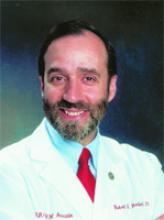Profession. When was the last time you thought about this word or pondered its place in your life—specifically, the profession of medicine? In considering it recently, I concluded that it is built on 3 pillars: stewardship of a body of knowledge, self-governance, and trust between doctors and society. I call these the pillars of medical professionalism.
A key component of the first pillar is our dual commitment to research and education. In short, as physicians, we agree to add to the body of knowledge and pass it along to others. We defend self-governance, the second pillar, by establishing and enforcing standards for practice and credentialing. And it is vital that trust, the third pillar, be symmetrical between doctors and the larger society. When it is, patients and the community recognize the important work performed by physicians, and we in turn demonstrate the primacy of our commitment to the public.
We are living through a renaissance in biomedical research, expanding the body of knowledge that constitutes the science of medicine. We have made truly miraculous strides in our ability to understand, diagnose, and treat disease. As a result, this first pillar has never been stronger. Paradoxically, the other 2 pillars are significantly weaker than they have been in recent memory.
Why? One reason self-governance has been weakened is the structure of modern medical commerce. For example, attempts by insurers to “manage” pharmacy benefits lead to oddities such as the following: Although a physician has prescribed raloxifene, the pharmacy—under the direction of a managed-care firm—notifies the doctor that it will be dispensing alendronate. We may be comfortable with the substitution of generic drugs for brand names, but the replacement of a selective estrogen receptor modulator (SERM) with a bisphosphonate clearly impinges on the core pillar of self-governance.
Only by relentlessly pursuing both quality and safety and adhering to evidence-based medicine whenever possible will we maximize our ability to self-govern. That ability would be enhanced by legal changes such as the right of physicians to act collectively to challenge practices that eat away at the quality of patient care.
In addition, new medical-management strategies have eroded patients’ trust in our profession. These strategies include limiting access to medical care (even when the patient believes it is necessary) and extending monetary rewards to doctors who successfully curb patients’ use of medical resources. Yet, we can counter these strategies by continuing to provide services on a pro bono basis, when needed, to people with limited access to medical care.
Only by relentlessly pursuing both quality and safety and adhering to evidence-based medicine whenever possible will we maximize our ability to self-govern.
These 3 pillars are not modern constructs, but have been recognized in some form for more than 2,400 years. The Hippocratic Oath, which remains an important part of our understanding of ourselves as doctors, identifies many of the behaviors that increase professionalism. It opens with the promise to teach the art and science of medicine to the next generation and to revere those from whom we learn. It deals explicitly with the concept of trust, stating that the physician will abstain from “intentional injustice” and “mischief” and maintain confidentiality in matters relating to individual patients. “Whatever houses I may visit,” it states, “I will come for the benefit of the sick.” The oath itself represents our first step toward self-governance, laying out and elucidating the key principles of our profession.
These traits are likely to remain a solid foundation of medical practice for centuries to come. But the responsibility for preserving them rests with us. We are the link between Hippocrates and future generations of doctors. We are the guardians of professionalism.


